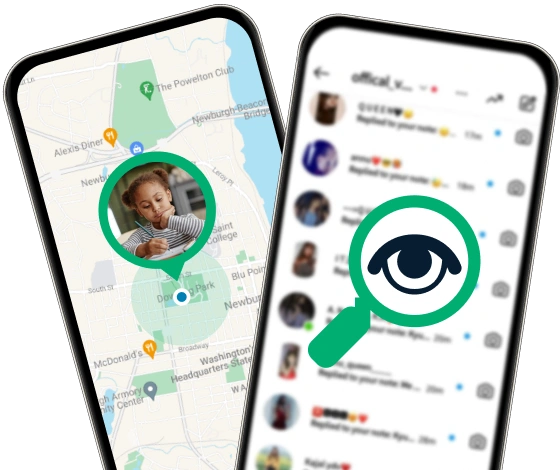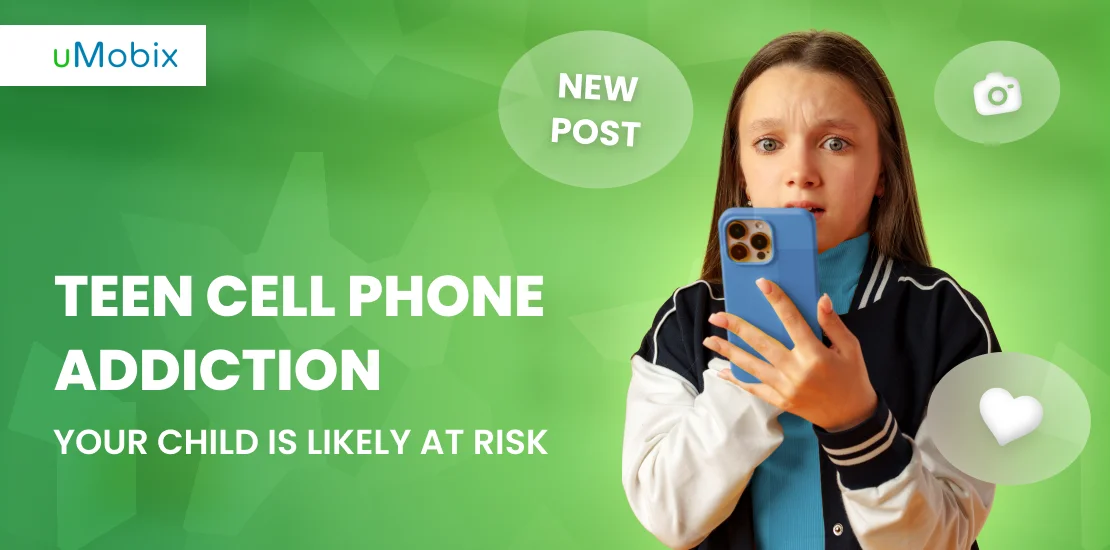For a teen and even for a kid, it is Ok to have a smartphone. This little device helps to be in touch with friends and parents wherever you are. It gives you access to the Internet and helps a lot in school, everyday life, and having fun. Teenagers use their smartphones in almost all activities, including social interactions and studying. Cell phones are too useful nowadays. And that’s why over 84% of teens own one. But you have to distinguish regular use from cell phone addiction.
What is cell phone overuse?
To use a smartphone for social networks, watching movies, and playing games is ok. There is nothing wrong with it. But if a teenager tends to spend all their free time holding the device in his hands – it means that cell phone addiction is around the corner. At this point, you have to find out what attracts your child so much. Understanding the reason will help you to find the solution.
By the way, just taking the device away from your child is counterproductive. Next time, he will hide the cell phone hearing your steps, pretend sleeping, doing homework, or reading a book. And you won’t even know about it.
Parental control
Every single smartphone has a built-in parental control function. For example, Android devices have the Family Link app by default. To activate it, go to Settings -> Digital Wellbeing and Parental Control -> Parental Control. Then follow the instructions to set it up.

Parental control is an absolute must because it gives you the next opportunities:
- Always know where your child is.
- See what apps he uses and how much time he spends using them.
- Block the ability to install apps you don’t want him to use.
- Limit app usage and overall screen time.

Why do I have to use parental control?
He is not a toddler, kid, or baby. But a smartphone is a powerful tool with great possibilities. It is a double-edged sword. A cell phone can help your child get knowledge and skills to become an excellent student. Or it can make him addicted to games or social networks. That’s why you have to monitor his device usage with the parental control app to see if he spends all the time playing or using social media.
Having actual data, you can consult a pediatrician and find out the best solution. Video game disorder is quite different from social media addiction. Treatment is different too.
Is there anything I can do to prevent the harmful effects of cell phone addiction?
Of course! As a parent, you have to teach your child how to use a mobile phone or tablet properly. It is not about mental health but actual healthcare.

Postural disorders
Mobile devices are much more harmful to use than computers or consoles because they force you to bow. Apart from cell phone addiction, it causes the next postural disorders:
- Texting Neck. To see the screen, you have to look down. And an average person repeats this procedure 150 times per day. Still, it is ok to look down for a few seconds. But not for hours. If you keep this position for too long, you will overstretch and weaken head supporting muscles. Muscles on the front of the neck will become shorter, fixating the head in that unconfident sad position. And causing a lot of pain in the neck.
- Round-shouldered posture or mom posture. The usage of a smartphone or tablet does not promote a healthy position of the shoulders. A child brings hands and shoulders together to hold the device. He overstretches back muscles and shortens his chest. It ruins the precious natural beautiful balance between frontal and back muscles.
- Anterior pelvic tilt. The same way it works with back muscles and abdominal muscles. Specifically, if a child likes to lay on the belly while using the device.
How to fix it? Teach him to do simple neck and shoulder stretches while using a smartphone or tablet. And change the position from time to time. Swimming and special exercises also would help to develop the right posture.
By the way, if he can use a computer or TV instead of a mobile device, it would be better to switch.
Vision disorders
A cell phone screen is a bright source of light. As a result, it puts a lot of strain on the eyes and causes pain. And there are also other disorders you have to consider:
- Blurred vision. Our eyes are good at switching from one object to another. And they are bad at staring at one spot. It puts a lot of strain on muscles in and around the eye.
- Dry eyes. We blink less while staring at the screen. It is not healthy.
Avoiding it is pretty simple. Looking somewhere else would help the eyes to relax. Do it every 5-10 minutes for a few seconds. It will be enough.
What about the mental side of addiction to a cell phone?
Cell phones make it too easy to access social media for teenagers. You don’t need to go home and turn on the computer. You have to take a phone from your pocket, unlock it, and launch the app. And a teenager can do it everywhere. At home, school, in transport, while walking in the street. As a result, a lot of students regularly check social media for updates, chat a lot, and look for something to laugh at. Almost everyone has an account on Facebook, Instagram, or Snapchat.

Regular access to social media leads to FOMO or Fear Of Missing Out. It is not a mental disorder or serious issue. This is the way society works. Youngsters chat face-to-face and online a lot about news, viral videos, celebrities, school, movies, TV series, games, events, parties, etc. They like to share knowledge and, most important – their opinion on different things. That’s why a teenager wants to get all the news first, or at least know as much as his peers do. Either way, he would feel left behind and disconnected.
Also, a teenager urges to be a part of the society of his peers. And because most teenagers use cell phones and social media to be in touch, so does he. This way, he could know about events, news, etc. Just asking about it in a classroom is not enough. What would you think about a person who does not know the president’s name?
Does cell phone addiction need any treatment?
In most cases, it does not. If a teenager puts healthcare, hobby, school, and family before social media, it is ok. If his priority is to stay online all the time, it can be a case of social media addiction. You can define it by the next symptoms:
- He keeps his smartphone near him all the time.
- There is no way he would ignore any notification.
- He hears false message notifications.
- He uses social media even while having a meal or watching a movie.
It can mean that he feels falling out from society of his peers. If you try to separate him from his device, you’ll worsen the situation. So, it would be better to consult mental health professionals first before doing anything. Remember, you want to be a helping friend to your child, not an enemy.
Why not just cut off social media from my child?
Social media is the present and future of our society. They are the main way of knowing what is happening around them. They help to discover the world, and they help to interact with others. Social media help young people to collaborate to solve problems they cannot solve on their own. And there is no direct impact of social media use on the number of face-to-face interactions, grades, or behavior. It mostly depends on the person. If he likes to party, social media will help him to gather friends faster. If not, he or she would stay at home regardless of having a cell phone or not.
Can social media influence a teenager?
Social media – cannot. People who use social media – can. Because there are a lot of bloggers, content creators, vloggers, journalists, artists, etc. Social media is a whole different ecosystem.

That’s why it is important to look after your child while he uses the smartphone. And you will know something is wrong if he:
- suddenly comes up with extraordinary ideas. (drop off school for business, blogging)
- talks a lot about certain people.
- suddenly changes his style and behavior.
Why can a teenager do so? Because someone told him that it is the way to success. Because he might take after someone who breaks the rules, goes against the system, and looks really cool. It resonates with teenager’s desires. He is not a baby and he wants to prove his relevance. That’s why you have to know what your child is doing online.
Powerful parental control, such as uMobix, also helps to prevent kids from going to websites you don’t want them to visit. It blocks adult content, gambling sites, apps, etc.
Conclusion
There is no cell phone addiction. Obviously, a cell phone cannot cause depression or pregnancy. It is just a piece of glass, metal, and plastic. Teenagers and adults use smartphones for surfing the browser, social media, news, gaming, etc. So, if someone plays too much via a smartphone, it can be a gaming disorder. And, if someone is glued to social networks it might be social network addiction. Holding a device in your hands does not cause addiction. The way you use it – can cause cell phone addiction.
To prevent any kind of addiction or negative impacts, smartphone manufacturers strongly recommend using built-in parental control apps. It is a simple and reliable way to monitor and control cell phone usage. This is the first step you have to take.

Latest posts
- 10 Best Apps for Parents to Monitor Social Media: 2026 Guide
- Complete List of Keywords to Block for Parental Control
- Does Telegram Notify Screenshots? Everything About Screenshot Detection
- How to Find Someone’s Deleted Instagram Posts: Complete Guide
- Family Tracking App by uMobix: Keep Loved Ones Safe




